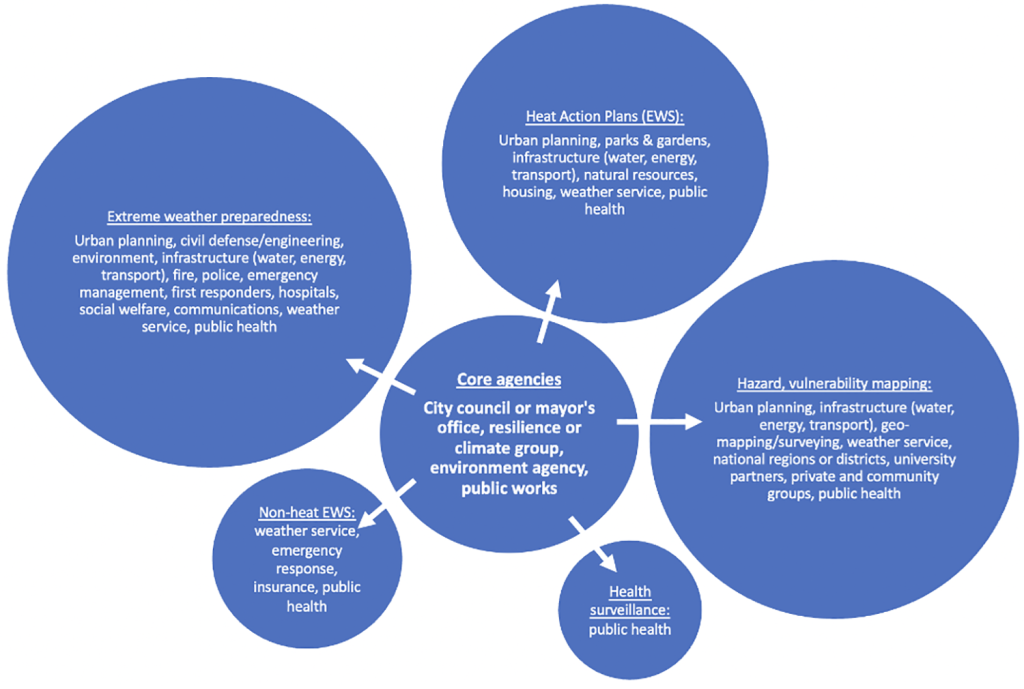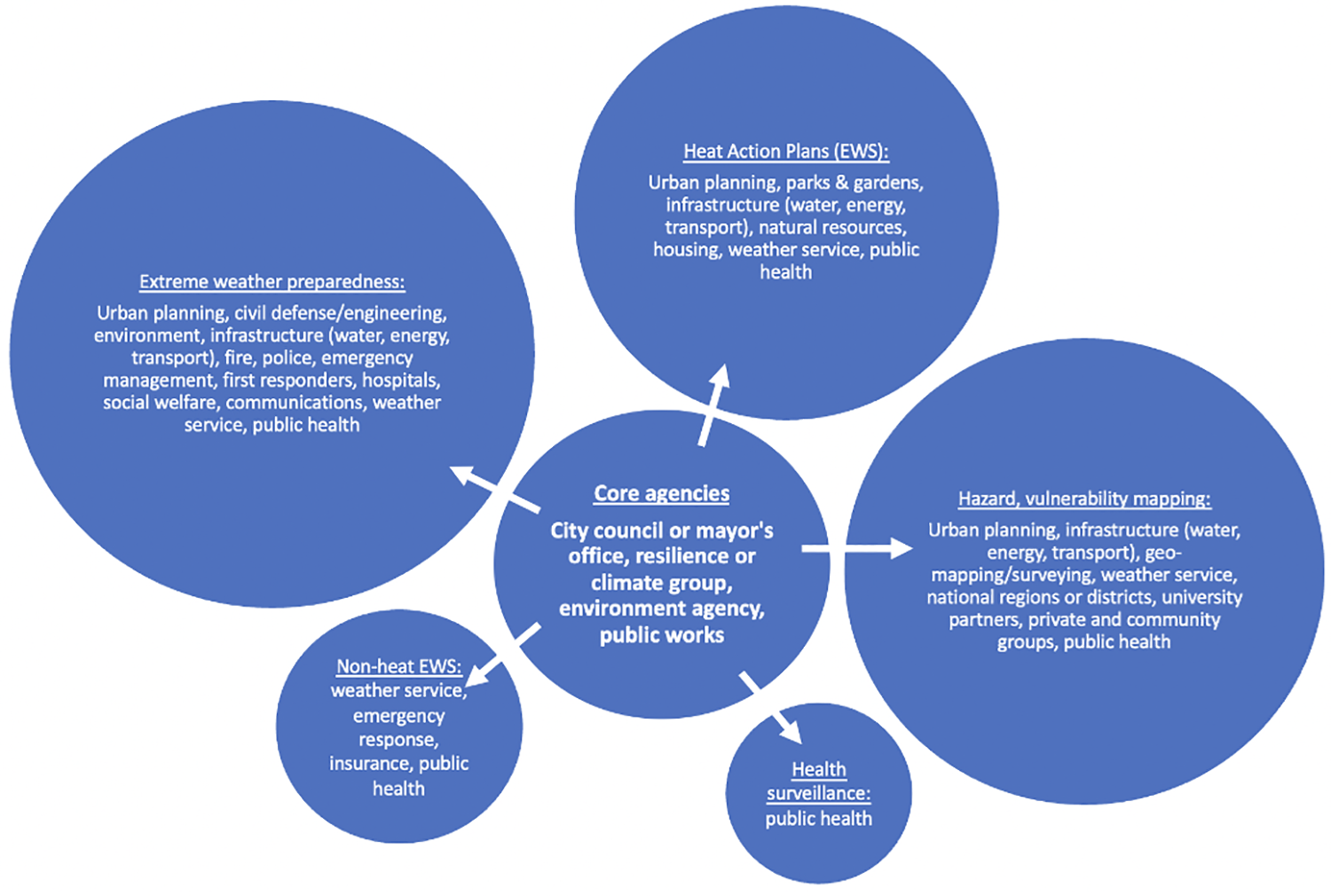The implementing agencies overall reported climate plans for 22 major cities that are highly adaptive to health, across five areas of health-related activities. Credit: Sheehan et al., 2022, PLOS Climate, CC-BY 4.0 (creativecommons.org/licenses/by/4.0/)
Large cities do not involve public health agencies in their climate adaptation plans
A review of climate adaptation plans for 22 large cities found that while most of them include important measures to promote public health, fewer cities have engaged public health agencies in these plans.
Mary Sheehan of the Johns Hopkins Bloomberg School of Public Health in Baltimore, Maryland, and colleagues presented their findings in the open-access journal PLOS Climate on March 3.
With climate change, urban residents are exposed to greater risks from a range of hazards, including heat, floods and droughts. Many cities have chosen to develop climate adaptation plans that include a primary focus on public health. However, given the limitations of research, the extent to which cities’ highly focused health plans are integrated with public health actions and the involvement of public health agencies is unclear.
To improve understanding, Sheehan and colleagues evaluated climate adaptation plans in 22 large cities that were already known to focus on adaptations that promote public health. They analyzed the extent to which these cities’ plans include actions that fall into five categories considered promising to enhance public health, such as severe storm preparedness or early warning systems for infectious diseases.
The analysis found that 90% of plans include actions in at least three of the five health-related categories. Of these plans, however, only 73% include public health agency involvement. Cities in low- and middle-income countries were more likely to involve public health agencies in climate change adaptation plans than cities in high-income countries, although cities in which public health agencies were most involved also included Barcelona, Baltimore, and São Paulo. Francis. Plans with greater involvement of public health agencies often included early heat warning, followed by stormy weather preparedness measures and risk mapping.
The analysis also examined the different approaches to climate adaptation plans. For example, the Baltimore Plan is coordinated by its Office of Sustainability and includes a primary focus on preparedness for extreme climates, while the London Plan is coordinated by the Mayor’s Office and includes a broader focus on environmental strategies. The Barcelona Plan illustrates the integration of different city agencies in addressing adaptations to protect public health.
The researchers say their findings support efforts to engage public health agencies more deeply in climate change adaptation and identify additional opportunities for large cities to integrate public health into adaptation plans.
The authors add: “Local regions drive climate adaptation, and in this study we found that involving local public health in climate adaptation plans can make a difference. Extreme heat is most common. The presence of public health brings data, for example, on health impacts and vulnerability , which can lead to a greater focus on people – and better protection for those who need it most. Looking ahead, we find there is an opportunity for more public health engagement in areas such as severe weather preparedness and vulnerability mapping, in partnership with the Emergency Management and Weather Services. and other agencies.
reference:
Sheehan MC, Khudairi F, Swaich GS, Hines W, Mehta S, Fox MA (2022) Climate management and urban health: Mapping the role of public health in the adaptation plans of large global cities. Plus Clime 1 (3): e0000012.
https://doi.org/10.1371/journal.pclm.0000012
Henrique Cortez * Translation and editing.
at EcoDepateISSN 2446-9394, 04/03/2022
The EcoDebate e-magazine can be maintained thanks to technical support and hosting easy port.
[CC BY-NC-SA 3.0][ O conteúdo da EcoDebate pode ser copiado, reproduzido e/ou distribuído, desde que seja dado crédito ao autor, à EcoDebate com link e, se for o caso, à fonte primária da informação ]
Inclusion in the EcoDebate daily newsletter distribution list, ISSN 2446-9394,
If you would like to join our daily newsletter distribution list, simply send an email to newsletter_ecodebate+subscribe@googlegroups.com. Your email will be included and you will receive a message asking you to confirm your subscription.
EcoDebate does not practice SPAM The source email confirmation clause is intended to prevent your email from being incorrectly included by third parties.
Remove the EcoDebate daily newsletter distribution list
To unsubscribe from this group, send an email to newsletter_ecodebate+unsubscribe@googlegroups.com or ecodebate@ecodebate.com.br. Your email will be removed and you will receive a message confirming the removal. Note that removal is automatic but not instant.

“Hardcore beer fanatic. Falls down a lot. Professional coffee fan. Music ninja.”







More Stories
The law allows children and adolescents to visit parents in the hospital.
Scientists pave the way for the emergence of a new element in the periodic table | World and Science
Can dengue cause hair loss? Expert explains how the disease affects hair